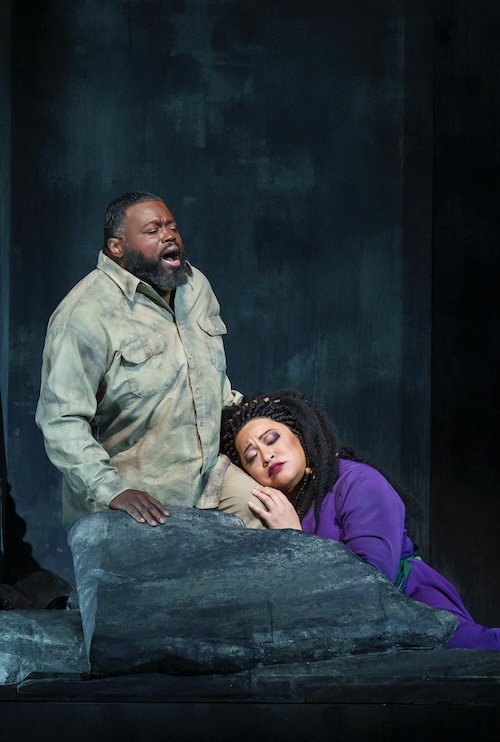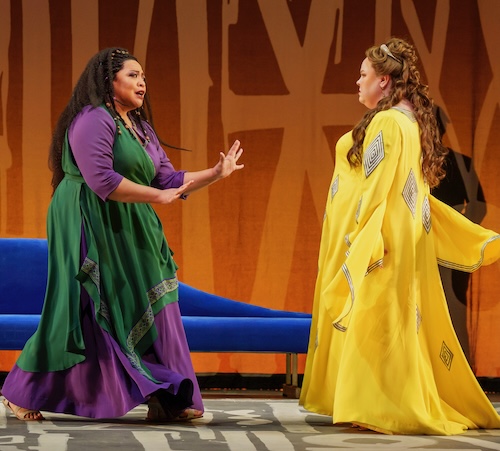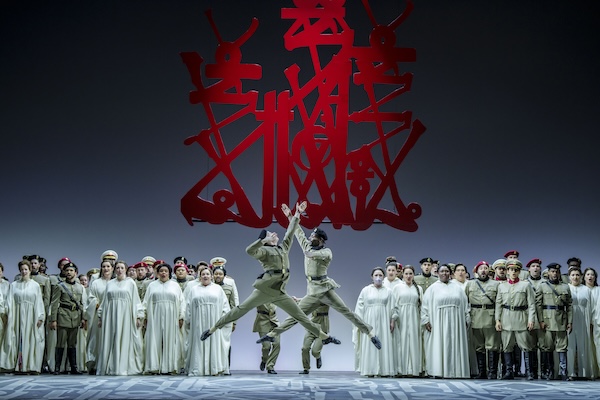Bradley provides fleeting highlights in Lyric Opera’s grim, militaristic “Aida”

It has been 12 years since Lyric Opera last took the long trip down the Nile. On Saturday night, Verdi’s Aida returned to the Civic Opera House in the final production of the company’s current season.
This Aida also marks the last show of the Anthony Freud era, at least with the out-going British administrator still on the job and presiding. (The company’s 2024-25 season will be announced Tuesday afternoon.)
Set in ancient Egypt, Giuseppe Verdi’s third-to-last opera relates the tale of the dangerous love triangle between Radamés, the Egyptian general in love with Aida, a captured Ethiopian slave girl. Serious complications ensue when the princess Amneris, the king’s vindictive daughter who is also in love with Radamés, discovers the illicit romance.
While this sand-and-sandals tragedy may be epic in its broad tapestry, Verdi’s magnificent music reflects emotions that are basic, human, and intimate. Still, Aida remains the grandest of grand operas, ideally combining spectacle, rousing choruses, ballet, and soaring arias in an exotic landscape with a typically pitiless Verdi finale.
Well, maybe not so grand or exotic. Those who expect some degree of lavish spectacle and Egyptian elegance with their Aida should wait in the car during this Lyric production. With the engine running.
Director Francesca Zambello here does another of her ham-fisted revamps, moving the opera from ancient Egypt to what appears to be either a contemporary, neo-fascist banana republic or—judging by some of the military garb—the Nasser-era Egyptian state of the mid-20th century. The opening scene is set not in the Egyptian king’s golden royal hall at Memphis but in a stark, dingy army meeting room with gray-green walls, fluorescent lighting and aluminum chairs and tables. The same set becomes an interrogation room in Act IV where Amneris and Radamés sit at far ends of a long table.
In her program note, Zambello states that she views Aida as a “chamber opera,” which seems more like a convenient euphemism for “cheap.” Everything looked cost-effective and crummy with minimal sets (Michael Yeargan off his usual game) and scenic elements.
The visual low point came in the not-so-triumphant Triumphal March of Act 2. There was zero pageantry with the chorus in military fatigues, and the Egyptian priests looking more like Russian Orthodox clergy. The ballet consists of one female dancer amid a corps of strutting males, in cliched, uninspired choreography that makes halftime at the Super Bowl seem like Giselle. The climax of the scene was a burst of golden confetti falling from the ceiling. Zambello must have left the revolving disco ball at home.
The production reunited Michelle Bradley and Russell Thomas, from their successful Lyric Opera Tosca of two years ago.
Once again the soprano provided most of the vocal highlights in the title role. Bradley has a poise and presence that make her portrayal of the conflicted character compelling even when she is standing still. Her voluptuous voice soared in Aida’s big moments, carrying easily over the massed ensembles and large orchestra of Act II.
“Ritorna vincitor” was a wonderful piece of singing and musical storytelling. “O patria mia” proved less steller opening night, well sung but heavier on volume than expressive sensitivity in Aida’s ode of longing for her homeland. Bradley was impassioned in her scenes with Thomas and affecting in the doomed lovers’ farewell to earthly existence (“O terra, addio”).
As Radamés, Russell Thomas had a rough start to the evening. Granted, Verdi makes life difficult for tenors in this role, having to enter in the opening minutes of the opera and sing one of the most challenging arias in the repertoire.
Even so, Thomas’s arduous rendition of “Celeste Aida“ verged on painful with threadbare quiet singing and barely held top notes. His middle voice was weighty and secure but anything high, soft or sustained proved problematic. The tenor was virtually inaudible amid the large ensembles of Act II.
Thomas seemed to regain vocal strength after intermission and brought more fire and power to his confrontation with Aida and the final duet; still, high notes remained short and strenuous with soft passages insecure. The burly-voiced tenor has been performing demanding Verdi roles for some time now and, having just sung his first Parsifal two months ago in Houston, it appears that these heavy assignments haven’t done his voice any favors.

Jamie Barton was a strangely anodyne Amneris for much of the evening, her under-projected singing and off-and-on dramatic commitment, seemingly storing up resources for Act IV. There in her climactic scene with Radamés, the mezzo finally cut loose both vocally and dramatically, giving full vent and desperation to Amneris’s jealousy and self-recrimination.
Fresh from his acclaimed performance as the aged Emile Griffith in Champion, Reginald Smith, Jr. sang with ample ballast and power as Amonasro, Aida’s father and the vengeful king of the Ethiopians—here morphed into some kind of subversive army insurgent.
The singer has injured his left foot, which caused him to sit out the Aida dress rehearsal. Still, Smith showed himself a trouper opening night, hobbling around gamely with a cane, even if he missed his first entrance in a scary theatrical moment. (Aida cried “My father!” when Amonasro was nowhere visible on stage.) A company spokesman declined to provide details about Smith’s injury, but said the baritone is expected to sing the rest of the Aida run.
The impressive Ryan Center member William Clay Thompson made a superb King, displaying a youthful and commanding bass. Önay Köse was a dignified Ramfis in his company debut. Kathryn Henry proved an elegant Priestess, Alejandro Luevanos, an adequate Messenger.
Anytime an opera production includes someone with a made-up name in capital letters, one should be afraid. In fact the artistic motif of “RETNA” (aka Marquis Lewis) was the sole successful production element. Lewis/RETNA’s calligraphic designs provided a welcome infusion of color and vibrancy to the drab visuals and, at least, showed creativity with a plausibly hieroglyphic-like style.
While the ballet music was left intact, it might as well have been jettisoned for what little was done with it, the lone female dancer doing most of the heavy lifting. A large, red overhanging pattern along with the regime’s cavorting military cadets offered uncomfortable echos of China’s “Red Detachment of Women.” The ballet of Act I consisted of a bunch of kids running around playing childish games, a corny and tiresome Zambello trademark.
It says something about the upside-down world of Lyric Opera in the Freud era that the company breathlessly publicizes this show as conductor Enrique Mazzola’s “first Aida!” As if an inexperienced music director learning basic Italian repertoire at the expense of musicians and audiences is somehow a good thing.
That said, this was one of Mazzola’s more successful Verdi outings. While no one is going to mistake him for Toscanini anytime soon, the opening Aida performance had more thrust, edge and drama than Mazzola has brought to previous Verdi operas with less slackness and undue lingering.
The orchestra played well and, along with the excellent Lyric Opera Chorus, provided compensating power and majesty to the Triumphal March scene, qualities sorely missing from the prom-night visuals.
Aida runs through April 7. lyricopera.org

Posted in Performances


Posted Mar 10, 2024 at 6:13 pm by Bob
Oh dear. Not again.
Posted Mar 11, 2024 at 2:14 am by Tim
After hearing similar feedback from others who saw it Saturday, now I want to just go to New York and see the new production at the Met later this year instead.
Posted Mar 11, 2024 at 8:47 am by John
Anyone who has ever seen a Zambello-related opera should know to run away. Fast. Exhibit A: her San Francisco Ring cycle.
Aida is one of the big ticket-selling operas. Only Freud could turn it into this kind of low-rent production that will turn off the many first-timers who come to see it.
And you simply cannot put on an Aida without a tenor who has basic vocal production. How many years will it take to recover from the devastation that Freud has inflicted on the Lyric?
Posted Mar 11, 2024 at 10:46 am by GCMP
And yet, compared to how bad it might have been (remember Flying Dutchman?) this was really not that bad a production. Also, many of the vocal faults discussed above did not happen at the Dress Rehearsal, so there is hope for future performances.
Posted Mar 11, 2024 at 5:26 pm by Fiona
In most productions “Aida” runs 3 hours and 20 minutes, yet, this production is, somehow, 3 hours and 5 minutes.
No wonder, the singers cannot sing: they are simply out of breath. This would have never happened when Bruno Bartoletti was at the podium, he always made sure that the singers could breath and, thus, could sing. It is Enrique Mazzola’s first “Aida” and, it seems, he still has a lot to learn about this opera.
Posted Mar 11, 2024 at 6:17 pm by Genfre
This is not Aida. Aida is a story from ancient Egypt. This is false advertising.
Posted Mar 13, 2024 at 4:26 pm by Philip
What is with this season at the Lyric Opera?…two shows with dreary, colorless 20th century military motifs…this Aida and the Daughter of the Regiment.
I find it amazing that the current crop of dilletantes posing as opera directors seem hellbent on removing every bit of visual color and interest from these wonderful operas. It started with the dreary visuals of the Flying Dutchman and ends with Aida.
The Lyric seems to be a shell of itself considering the rich productions and international singing that graced many of the Fox and Krainik years. What a mess!
Posted Mar 13, 2024 at 10:04 pm by Peter DG
We were at the Wednesday matinee performance and it seemed to be much better than the Saturday opening night reported in this review. Russell Thomas’ Radames was strong and smooth with none of the problems noted above. Smith as Amanasaro didn’t have any of the foot problems noted. Bradley’s Aida was outstanding. Many supporting roles sung by Ryan Center members, not minor in Aida, were also very impressive, and with Lyric’s excellent orchestra and chorus this made for a really “grand” opera, as long as you ignored the sets and costumes.
But you had to conjure up other visuals in your mind to get the effect you expect from Aida’s pageantry and environment. Also the dancing didn’t seem to go well with Verdi’s triumphal march music.
It was truly better than I expected.
Posted Mar 14, 2024 at 12:38 pm by Ricardondo
Bradley was superb at the Wednesday matinee, but I have never heard a tenor cut off the last note of “Celeste Aida” so early. It was bizarre waiting for the orchestra to finish their conclusion.
But the real disappointment was the astonishingly inappropriate all-male ballet-like sequences (a la Keystone Cops) and the unforgivably confusing costuming and set design with pseudo-Japanese calligraphy.
Am very glad we saw the Lyric performance of this work 12 years ago.
Posted Apr 02, 2024 at 12:00 am by Tim
The curtain falls on Act 2 and the not so grand processional march scene (complete with confetti.) The fire cutain is lowered on stage. Ah, THERE is Aida!!!! The contrast could not have been more night and day, especially considering the history of the work in this place.
I might well have better enjoyed this Aida as a stage concert piece. The orchestra, chorus,and soloists were worthy, even if all of the latter were not consistently in top form tonight.
However, the way in which the production was staged robbed it of its power, undermining the strength and complex human drama of its chatacters, so essential to Verdi opera. Instead, we were left with a lot of confusing and shallow camp which didn’t come together like it should.
I don’t necessarily need a production to be overly grand and historic (though I do like elephants.) A contemporary take can offer freshness and unique insight. I even found certain elements of the scenic settings here intriguing and “not that bad.” But, when a director’s new take on an opera not only fails to show us something of value, perhaps previously de-emphasized or left little revealed, but instead undermines the essence of the story, it has gone too far and failed to achieve its purpose.
Posted Apr 07, 2024 at 9:34 pm by Stephen
We just saw it and were very disappointed. As the review stated, lacks the pageantry, and is grim and fascist militaristic. Who hires these people to do such terrible things to a great opera?